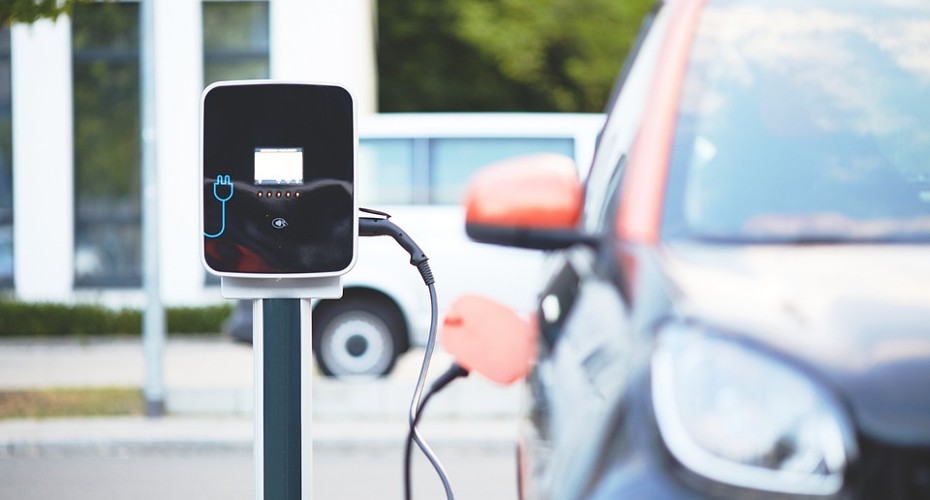Three ‘super-leverage points’ offer hope for climate breakthrough

Three “super-leverage points” could trigger a cascade of decarbonisation in sectors covering 70% of global greenhouse gas emissions, according to a new report presented today at the World Economic Forum in Davos.
With time running out to limit global warming to 1.5°C, the report shows how parts of the global economy could move rapidly towards zero emissions – with far-reaching effects across 10 of the highest-emitting sectors.
A leverage point is where a small intervention can cause a large effect – and the report’s “super-leverage points” not only cut emissions in one key sector, but also support faster changes in other parts of the economy.
The three super-leverage points are: mandates for the sale of electric vehicles, mandates requiring “green ammonia” to be used in the manufacturing of agricultural fertilisers, and public procurement of plant-based proteins.
These changes could trigger a cascade of tipping points, leading to cheaper batteries to help solar and wind scale-up in the electricity sector, cheaper hydrogen opening up decarbonisation for the shipping and steel industries, and reduced pressure for deforestation.
The report, “The Breakthrough Effect: How to trigger a cascade of tipping points to accelerate the net zero transition,” is produced by an international team including Systemiq and the University of Exeter, and is a contribution to Systems Change Lab convened by the Bezos Earth Fund and World Resources Institute.
The report supports the Breakthrough Agenda, the First Movers Coalition and other initiatives working to make low-carbon solutions the most affordable, accessible and attractive option in each emitting sector.
“With time running out, there is a need to be targeted,” said Mark Meldrum, Systemiq partner and a lead author of the report.
“Our report spotlights key opportunities to effect change that can produce huge returns in terms of decarbonisation.
“It identifies positive tipping points in the highest-emitting sectors of the global economy, and analyses the conditions required to trigger them.
“Each super-leverage point crossed raises the chance of crossing others, and could set off a cascade of positive tipping points to steer us away from a climate catastrophe.”
A tipping point in this context happens when a zero-carbon solution advances to a point where it outcompetes the existing high-carbon solution. Once reached, self-reinforcing “feedback loops” drive exponential growth in the adoption of the new solution and a rapid decline of the old.
“High-emitting sectors of the economy do not exist in isolation – they are deeply inter-connected, and zero-emission solutions can influence transitions in multiple sectors simultaneously,” said Simon Sharpe, a lead author of the report.
History is rife with examples of positive tipping points. In 2012, US coal power peaked before it was undercut by prices of renewables and gas. Utilisation fell below 50%, half the companies in the sector went bankrupt within two years and total demand is now 60% lower than peak.
The report says a tipping point has already been crossed in the electricity sector, with solar and wind accounting for more than 75% of new global capacity built last year.
Kelly Levin, Chief of Science, Data and Systems Change for the Bezos Earth Fund, said: “We know that some systems can be pushed toward positive tipping points after which change becomes unstoppable.
“We must do everything we can to reach these tipping points as soon as possible, and this report helps provide critical information on where tipping points lie and how we might approach them more quickly.”
In the short term, a tipping cascade could be triggered by an initial set of three super-leverage points:
- A tipping point is “very close” in road transport, with falling costs, government policies and better infrastructure increasingly making electric vehicles more attractive than petrol and diesel cars to both manufacturers and consumers. Zero-emission vehicle mandates are a particularly powerful policy for bringing forward this tipping point. By rapidly increasing the production of batteries, prompting technological and cost improvements, electric vehicles could support the transition to clean power, and the decarbonisation of other sectors that need cheap and clean electricity.
- Mandates that require the use of green ammonia (produced from hydrogen made with renewable energy) to make agricultural fertilisers could be a highly effective way to kick-start the growth of the hydrogen economy. This would not only replace fossil-fuels in fertiliser production; it would also bring down the costs of green ammonia and green hydrogen, enabling their use as fuels in shipping and steel production, and for energy storage.
- Alternative proteins (especially plant-based proteins) can reach a tipping point by beating animal-based proteins on cost, while at least matching them on taste and texture. Public procurement (for example in schools, hospitals and government departments) could be a powerful lever to increase uptake of these products, leading to reduced emissions from livestock farming and freeing up an estimated 400-800 million hectares of land, equivalent to 7-15% of global agricultural land today. This would reduce incentives for deforestation and leave more land available to support carbon storage and biodiversity.
The report is part of a Bezos Earth Fund partnership supported by a £1 million grant.
It builds on prior Systemiq work on tipping points in “The Paris Effect” report, and is the most comprehensive analysis of positive tipping points to date.
The University of Exeter team are now leading a community of researchers working on a full “state of tipping points” report looking at both positive socioeconomic tipping points and negative climate tipping points in time for COP28 in November.
“We need to find and trigger positive socioeconomic tipping points if we are to limit the risk from damaging climate tipping points” said Tim Lenton, a lead author of the report.
“This non-linear way of thinking about the climate problem gives plausible grounds for hope: the more that gets invested in socioeconomic transformation, the faster it will unfold – getting the world to ‘net zero’ greenhouse gas emissions sooner.”
Rachel Jetel, Co-Director, Systems Change Lab, said: “We are well into the decisive decade for climate action.
“Exploring which levers to pull in our interconnected systems that will have the biggest impact and return for effort is absolutely vital.
“This analysis helps reveal the most effective routes to positive tipping points to accelerate the pace and scale of transformations needed to protect people and planet.”
Andrew Steer, President and CEO of the Bezos Earth Fund, said: “We know that radical shifts are required for meeting our climate and nature goals – from shifting diets, to restoring forests, to phasing out the internal combustion engine.
“How close are they to positive tipping points? And what are the barriers that must be removed so that change becomes irresistible and unstoppable? What’s the special sauce that have led some issues to suddenly rise on the agenda and solutions emerge?
“This report helps us answer some of these essential questions.”



